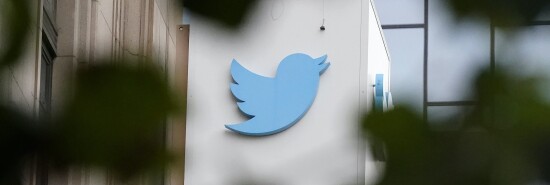
Elon Musk’s imperfect experiment with the newest wave of liberal-dominated media
W. James Antle III
Video Embed
If new Twitter boss Elon Musk didn’t reinstate the accounts of suspended liberal journalists within an hour and offer a public explanation by morning, Digital Content Next CEO Jason Kint warned (on Twitter, naturally), “I’ll be on Capitol Hill tomorrow demanding that he be hauled in front of Congress.”
So much for the argument that because Twitter is a private company it can make whatever banning and censorship — pardon me, “content moderation” — decisions it wants. That was the standard response whenever conservatives made these kinds of complaints or asked for Congress to intervene.
Since acquiring the social media platform, Musk has exposed the way in which the company, with varying degrees of input from government and political campaigns, made many of the decisions that outraged conservatives. And according to many liberal uses, he has made Twitter a dystopian nightmare in the process.
HARRIS GETS ‘NEW LEASE ON LIFE’ AS DEMOCRATS NEED HER TO BREAK FEWER TIES
This is unfamiliar territory for most liberals, who aren’t accustomed to their media creations turning on them or being used against them. Conservatives, however, have been protesting liberal bias by the transmitters of information to the general public for decades.
In 1969, Vice President Spiro Agnew delivered a stirring attack on the ideological tilt of the then-dominant network news. The speech was written by Pat Buchanan, who would go on to become an important conservative figure who prefigured the more populist cast of the Republican Party under former President Donald Trump.
“One Federal Communications Commissioner considers the powers of the networks equal to that of local, state, and federal governments all combined,” Agnew said. “Certainly it represents a concentration of power over American public opinion unknown in history.”
“The American people would rightly not tolerate this concentration of power in government,” he continued. “Is it not fair and relevant to question its concentration in the hands of a tiny, enclosed fraternity of privileged men elected by no one and enjoying a monopoly sanctioned and licensed by government?”
If you close your eyes, you can hear in this speech something akin to the present conservative critique of Big Tech, perhaps articulated by Sen. Josh Hawley (R-MO).
“Now I want to make myself perfectly clear: I’m not asking for government censorship or any other kind of censorship,” Agnew declared. “I am asking whether a form of censorship already exists when the news that 40 million Americans receive each night is determined by a handful of men responsible only to their corporate employers and is filtered through a handful of commentators who admit to their own set of biases.”
Richard Nixon’s number two contrasted the new media of the time with newspapers and concluded “a virtual monopoly of a whole medium of communication is not something that democratic people should blithely ignore.”
Agnew didn’t propose any public policy solutions, though many conservatives would come to support imposing equal time requirements on the liberal media through regulatory regimes like the Fairness Doctrine. But the monopoly power of the big networks was broken by technological advancements and competition, aided by deregulation — including the Reagan-era repeal of the Fairness Doctrine, which allowed for the flourishing of conservative talk radio.
Conservatives were an underserved segment of the market. Fox News and others sprung up to fill that vacuum.
Musk is, however imperfectly, conducting an experiment. Can even a billionaire just build his own Twitter, as Roger Ailes arguably built his own CBS News? The new populist iteration of the Right has become awfully dependent on quirky billionaires.
A key difference is that Facebook, Google, Twitter, YouTube, and other Instagram all derive much of their value from everyone who is interested in what they do as users. It’s not clear that slicing and dicing into smaller niche audiences would work as well as it did for television and has for other parts of the internet. That’s why conservative Twitter alternatives have so far stalled and it remains to be seen whether liberal-dominated alternatives can fare any better. A Fox News version of Facebook might not be responsive to the problem.
The throttling of the Hunter Biden laptop story or removal of select accounts while still allowing the widespread dissemination of disapproved views is subtler than Dan Rather‘s nightly blather.
Twitter cannot throw you in jail and it’s not clear that even the level of government involvement its policies disclosed by the Twitter Files violates the letter of the First Amendment. But the clandestine nature of that involvement, free of transparency and democratic accountability, at least raises questions about its spirit.
CLICK HERE TO READ MORE IN THE WASHINGTON EXAMINER
Musk may be dealing with these questions clumsily. But that doesn’t make them less important.
This might prove a tougher project than the electric car.
